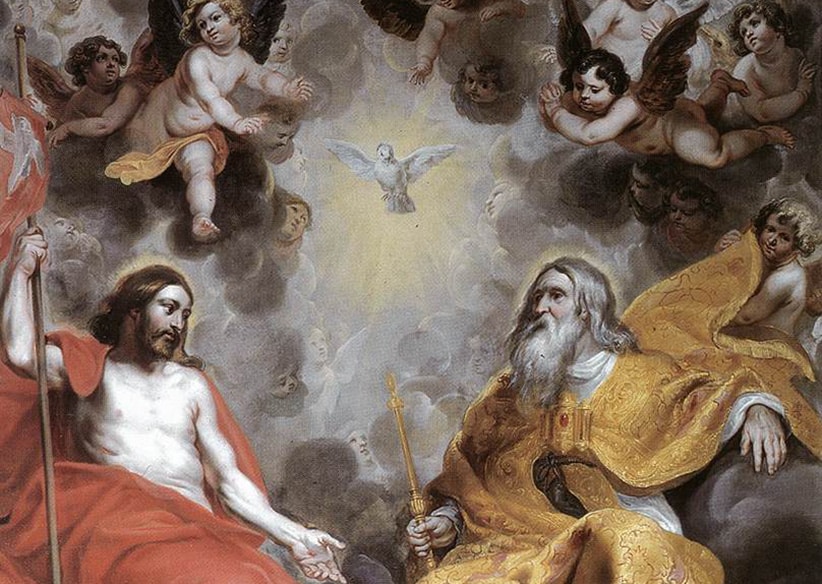Trinity Sunday is different.
From Advent to Pentecost, the Church invites us to celebrate what God has done for us — his incarnation and manifestation, his death, resurrection and ascension. Last Sunday, we celebrated the descent of God the Holy Spirit upon the apostles at Pentecost. These are things God has done; they belong to the redemption he accomplished for us. This Sunday, though, we take a different angle. Not unrelated to what God does, of course, but we meditate this Sunday more upon what God is — and that is, as the Roman Missal puts it, “one God, one Lord: not in the unity of a single person, but in a Trinity of substance.”
| June 4 – The Solemnity of the Most Holy Trinity |
|---|
|
Ex 34:4-6, 8-9 |
The Trinity is important. The Catechism of the Catholic Church calls it the “central mystery of Christian faith and life” (No. 234). St. John Henry Newman called it the “ground of the Catholic religion.” It is indeed a nonnegotiable dogma distinguishing the Christian from the heretic. The old Athanasian creed put it bluntly, that whoever did not preserve the Catholic faith in one God in Trinity would “without a doubt perish in eternity.” Those are indeed high stakes, and I don’t want to frighten you. I just want to underline what the Church has always claimed, that our belief in the Trinity and our worship of God in Trinity really matters. It’s a theological truth no preacher should belittle or slough off, no Catholic of any kind.
But why? Because, as St. Augustine preached, our Catholic faith “is not a bundle of opinions” but instead a “summary of biblical testimonies.” And that, really, is how best to think about the Trinity, by taking account of the biblical basics of Christian belief and experience.
For starters, alongside our Jewish sisters and brothers, we are strict monotheists. For us, Paul said, “there is one God” (1 Cor 8:6). Christians accept the truth of the Shema, too — “The Lord is our God, the Lord alone!” (Dt 6:4). But then there’s Jesus and our experience of him. In addition to his mercy and miracles, he both said and did some Godlike things. He walked on water, calmed storms, healed a man born blind and called God his Father as we worked on the Sabbath as God does. “The Father and I are one” (Jn 10:30); “Whoever has seen me has seen the Father” (Jn 14:9). Jesus said and did things like that.
Which is why, before having any ready theological vocabulary (that would come later) the earliest Christians knew, as a matter of visceral faith, that what was said about the Holy One of Israel was also to be said of Jesus. They knew that the Father sent the Son, and that they are one, that mysteriously “the Word was God” (Jn 1:1). And, of course, Jesus also talked about the Spirit both he and the Father would give, “the Spirit of truth” (Jn 14:17); Jesus, remember, called himself truth, the same Spirit we’d find acting with personality in Acts of the Apostles and in whose name Christians were baptized.
This, of course, is but the briefest of summaries, insufficient indeed. My point, however, is simply that given biblical testimony, and seeing it from the standpoint of the first Christians trying to make sense of their monotheistic faith as well as their experience of Jesus and the Spirit, it makes perfect sense that theologians in short order would have used the word Trinitas. Because it well summarizes all these “biblical testimonies,” as Augustine put it.
But what does this have to do with us? Everything! The Catechism teaches the Trinity is the source of “all the other mysteries of faith.” Practically speaking, what this means is that by the light of our faith in the Trinity, we can also have faith that when we encounter Christ in prayer or in the Church in the sacraments, we truly encounter God. Baptism is no mere sign; it’s really a participation in his death and resurrection. The Eucharist is no mere sign; it’s really Christ’s body and blood. The Trinity is the dogma that makes such divine intimacy possible. Which is why it matters to all of us and not just a few random theologians.





